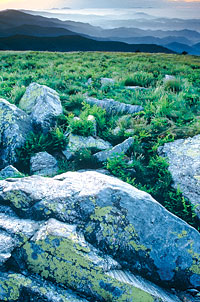Editor’s note: As we edge toward the dog days of summer—all dust, smog and sultry nights—the image of a cool spring outing might seem a pleasant one to press against your fevered brow. Writer Jonathan Poston insists otherwise.

Several months ago, a couple of friends of mine returned from a camping trip that started off great and ended under a torrent of ice and misfortune. The spur-of-the-moment trip seemed well-advised at the time, given that local forecasts were predicting beautiful weekend weather—daily highs of 70 degrees and overnight lows around 40.
From Asheville, the campers drove up to Graveyard Fields, near the 5,721-foot Mount Pisgah, intending to stay overnight. After setting up camp about a mile or so from the parking lot, they decided to hike farther in to check out a waterfall before dark. The falls were spectacular, and the weather was perfect—just cool enough to warrant a light jacket. They returned to camp full of inspiration and started a fire with wood they’d gathered earlier. They roasted hot dogs and ate them with zeal, washed down with cold drinks. As darkness fell, the clouds dispersed just in time to reveal a constellation extravaganza.
In the middle of the night, however, water vapor from the campers’ breath condensed on the fly of their two-person tent and began to drip into their sleeping bags, which were rated to a balmy 45 degrees. A thick, frosty goop soon pooled in pockets around them, covering the tent’s floor in an icy patchwork. Each breath they took made the situation even worse. And when their bodies erupted into full-body shivers, they decided to bail.
Lightweight coats in tow, they launched themselves from the tent, raked their ice-glazed gear into their numb arms, and took off through the silvery night, heading for the car. After dropping tent poles and assorted articles of clothing along the trail and having to turn back every hundred steps or so to pick them up, they finally reached the car. But there they discovered that forgetting to turn off a car’s headlights after going through a Parkway tunnel is a bad idea—the battery was completely dead. Just as the campers’ elation at having reached the car turned into anguish, a loud, low-built GMC Suburban with tinted windows and a “Buckle up With Jesus” vanity plate pulled up. It was 5:30 a.m.
Two large, fully camouflaged men sat slumped and motionless in their vehicle until one of the campers walked over to ask for help. The men nodded to indicate that they would help and pulled up beside the ailing car and popped the hood. After a successful jump-start, the men pulled away without speaking a word, and the erstwhile campers headed for a pre-dawn breakfast stop at Waffle House. Several eggs and waffles and a surly waitress later, the whole experience was filed away in the “do not tell anyone” portions of the campers’ brains.
Among the lessons worth drawing from this experience are:
• Don’t expect the local weather report to accurately describe conditions 3,000 feet above the forecast area.
• When you wake up shivering, don’t assume that a cold night will suddenly get warmer if you just go back to sleep.
• Don’t leave your shoes outside the tent—especially at 5,000 feet above sea level in the month of April.
• Don’t share your Buddhist beliefs with two large, silent mountain men dressed in camo, driving a vehicle with a “Buckle up With Jesus” vanity plate, either before or after they jump-start your car.
• Don’t take it on faith that sensors in your car will automatically turn off your lights at the end of long, dark tunnels.
• Writing in the third person can be a great blame-shifter; if I were you, I would definitely avoid planning a camping trip with the author of this story anytime soon.
[Last time we checked, Asheville resident Jonathan Poston was recovering well from his springtime adventure.]


Before you comment
The comments section is here to provide a platform for civil dialogue on the issues we face together as a local community. Xpress is committed to offering this platform for all voices, but when the tone of the discussion gets nasty or strays off topic, we believe many people choose not to participate. Xpress editors are determined to moderate comments to ensure a constructive interchange is maintained. All comments judged not to be in keeping with the spirit of civil discourse will be removed and repeat violators will be banned. See here for our terms of service. Thank you for being part of this effort to promote respectful discussion.